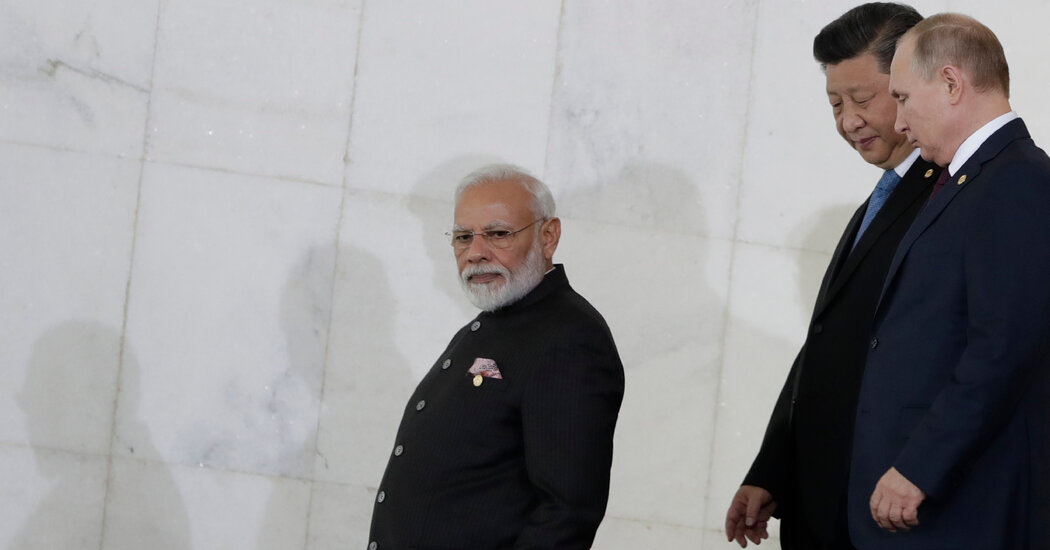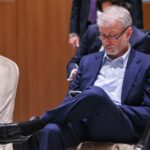
NEW DELHI — As international outrage over Russia’s invasion of Ukraine boiled over, foreign ministers and envoys filed in to New Delhi, hoping to pull India off the fence and into clearer condemnation of Russia, its longtime ally.
The United States offered a mix of carrots and sticks: signaling a willingness to expand defense cooperation with India, long dependent on Moscow for a majority of its weapons, but also calling India a “shaky” member of an important alliance of democracies known as the Quad. Prime ministers of Japan and Australia, both part of that alliance, held meetings with India’s leaders. Israel announced that its prime minister would arrive soon.
But when the United Nations again voted last week on a resolution critical of the Russian aggression, India stuck to abstaining. Then India further emphasized its relative neutrality: It also abstained from supporting a resolution that favored Russia. Instead, India called for an end to hostilities and respect for the territorial integrity of states — an expression of displeasure with Russia’s war without calling it out as an aggressor.
The Russian invasion of Ukraine and its backlash offer the latest manifestations of India’s effort to chart its own path through rapid changes in the world order in recent years. At the center of it is an increasing clarity among India’s foreign policy strategists that the country cannot afford to take sides in what is increasingly a multipolar world, officials and analysts say.
India’s vulnerabilities — including a slowing economy that is struggling to meet the demands of a growing population and an ill-equipped military stretched on two fronts by territorial disputes with China and Pakistan — are such that it needs allies far and wide, even if it means New Delhi has to work with the harsh reality of those allies’ bitterly opposing each other.
After decades spent trying to delicately navigate the Cold War legacy of a bipolar world, it is facing even more complications, including the rise of an expansionist China on its doorstep.
“Our position is not that this is not our problem — our position is that we are for peace,” Subrahmanyam Jaishankar, India’s foreign minister, told the country’s Parliament on the day India again chose to abstain from voting against Russia at the United Nations. “Indian foreign policy decisions are made in Indian national interest, and we are guided by our thinking, our views, our interests.”
The debate in the Upper House that day was indicative of the difficult waters India is navigating.
There was talk of a Western “double game” in pressuring India to stop oil purchases from Russia, just about 1 percent of its overall oil imports, while Europe continued buying Russian oil. But there was also questions of what India’s neutral position means for its security. Does India risk angering the United States and other Quad countries partnered in bolstering security against China? What if Russia and China drew closer as a result of the Western sanctions?
Dr. Jaishankar is in a unique position, at once the chief theorist of India’s vision for a path in this complicated new world order and the person responsible for the difficult work of implementing of that vision.
During his four decades in India’s foreign service, he held ambassadorial postings in Washington and Beijing before retiring in 2018 as the country’s highest-ranking bureaucrat in the service. He was chosen by Prime Minister Narendra Modi to become foreign minister a year later, but he used the gap to produce a book, “The India Way: Strategies for an Uncertain World,” on the country’s foreign policy doctrine.
In the book, a favorite reference of foreign diplomats in New Delhi, he attributes much of the challenge of the fluctuating world to the consequences of a “greater individualism, more insularity and sharp retrenchment” by the United States in recent years, along with the rise of a more aggressive China.
“It would require advancing national interests by identifying and exploiting opportunities created by global contradictions,” Dr. Jaishankar wrote.
Just how delicate that work is in practice played out last week, during the visit to New Delhi by the Chinese foreign minister Wang Yi.
It was the first ministerial visit between the two countries since the deadly skirmishes in the Himalayan borders two years ago, which have kept the relations tense.
Indian officials stressed that the meetings with Mr. Wang were aimed at expediting the disengagement of the tens of thousands of troops, a slow process despite 15 rounds of talks between the two militaries.
But many analysts saw in the timing of the visit, and the messaging from Beijing and Moscow around it, an effort to exploit the divergence between New Delhi and Washington — and even to show India in one bloc with Russia and China.
More such efforts are likely. Russia’s foreign minister, Sergey V. Lavrov, who has listed India and China among countries “who would never accept the global village under the American sheriff,” is expected to arrive in New Delhi later this week.
India’s difficult choices are driven by its own vulnerabilities — particularly an economy that is not living up to its potential — and the legacy of decades of dependence on Moscow and mistrust of Washington.
India lagged far behind China in opening up its economy, missing out on the early benefits of globalization that turned Beijing into a giant. India’s smaller G.D.P. — about $3 trillion, one-sixth of China’s — and the needs of a population of 1.4 billion have constrained the country’s military spending.
“Ultimately, the real security lies in economic growth and, you know, quickly getting to something close to $10 trillion,” said Arvind Panagariya, an economics professor at Columbia University who formerly advised Mr. Modi. “Basically what China did. Who would have taken China seriously until 1990?”
For a large part of India’s independent history, its leaders have looked to Moscow not just for weapons’ supplies, but also for political support at the United Nations. Moscow remained a steady ally when Washington repeatedly upset New Delhi, including aiding Pakistan — India’s enemy — and imposing sanctions on India for developing nuclear weapons.
Even as the ties with Washington have grown to a point that the United States is now India’s largest trading partner, there are still jolts of hesitance for New Delhi. The latest came from the U.S. withdrawal from Afghanistan. India had closely aligned its interests there with the American presence, only to see the United States leave Afghanistan to the Taliban, which New Delhi has long seen as a proxy of a Pakistani military that is hand in glove with Beijing.
Russia-Ukraine War: Key Developments
Ongoing peace talks. During peace talks between Russia and Ukraine in Istanbul, Russia promised it would “reduce military activity” near Kyiv, and Ukraine said it was ready to declare itself permanently neutral. Even so, weeks of further negotiation may be needed to reach an agreement, and Russia appears determined to capture more territory in eastern Ukraine.
In its quest for “strategic autonomy,” India has been slow in creating distance from Moscow. While India has increased its weapon purchases from the United States from little to about $20 billion in the past decade, it still depends on Russia for about 60 percent of its military equipment.
“I think people in the U.S. government understand and appreciate the complexities of India’s position,” said Kenneth Juster, the former U.S. ambassador to New Delhi. “But the atrocities committed by Putin will pose a challenge for India and other countries in terms, at some point, of having to further distance themselves from what he’s doing.”
The Indian government’s confidence that its divergence from Western pressure on Russia will ultimately not damage its relations is rooted in the fact that India is an important potential check on China’s expansionist foreign policy.
New Delhi joined the Quad alliance despite strong opposition from Russia and China, which have both likened it to a NATO in the east aiming to encircle China. But India has maintained its balancing act, buying weapons from Russia, including a missile defense system, despite threats of U.S. sanctions.
About two weeks into the Russian invasion of Ukraine, the leaders of the Quad held a summit meeting that was seen as a show of unity despite India’s not being on the same page on Russia’s war.
“As far as the Pentagon is concerned, we are a pin on the map in the Indian Ocean region,” said Tara Kartha, who served in India’s National Security Council for nearly two decades. “We are not that in Europe, where we have no role to play in hard defense terms.”
Russia’s brutal campaign in Ukraine, and the possibility that Moscow will most likely emerge diminished from the war and sanctions, may accelerate India’s shift away from Moscow and facilitate an expansion of defense ties with the United States, some analysts said.
But Dr. Kartha said that would be a slower process requiring the bureaucracies of both sides to overcome rooted hesitancy. There remains a “deep distrust of the U.S.” in the Indian bureaucracy because of a legacy of seeing Washington as patronizing and unreliable.
“The U.S. bureaucracy has a lot of ifs and buts before it signs anything, while you have Russia coming and saying, ‘OK, let’s do this co-production’ and it’s done,” Dr. Kartha said. “Unless the U.S. is able to get past its own bureaucracy and its own way of thinking, we will still continue to be dependent on Russia.”




